5 Best barcode Scanners for Retail Stores
The world seems to be evolving with every passing day. Running a business like a retail store is quite demanding and challenging at the same […]
Choosing the right ePOS system can make or break your business. Whether you run a small boutique, a bustling supermarket, or a multi-location chain, your POS system must integrate seamlessly with your operations, provide real-time reporting, enhance customer service, and maintain data security and ease of use.
The right POS system depends on your business type. From clothing stores to electronics shops, the ideal system should be able to handle your specific needs:
Next Step: Get Matched with the Best Retail POS for Your Business
Below are the 10 best retail ePOS Systems in the UK in 2025:
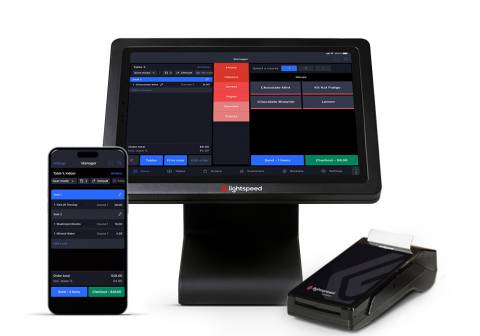
Lightspeed Retail offers a comprehensive, cloud-based POS system that streamlines retail operations across multiple channels. No matter whether you manage a boutique, a home décor store, or a multi-location operation, Lightspeed offers the features and flexibility you need. The key features include:
Pros:
Cons:
Next Step: Request a Free Demo
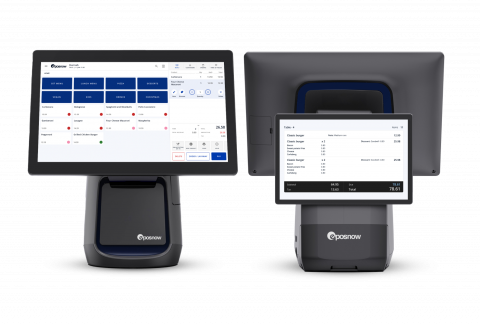
EPOS Now is one of the UK’s most popular POS systems, especially for small to medium-sized retailers. It offers a highly affordable, cloud-based solution for everything from inventory management to sales tracking. With its strong integration capabilities, it’s an excellent choice for businesses that need flexibility. The key features include:
Pros:
Cons:
Next Step: Request a Demo
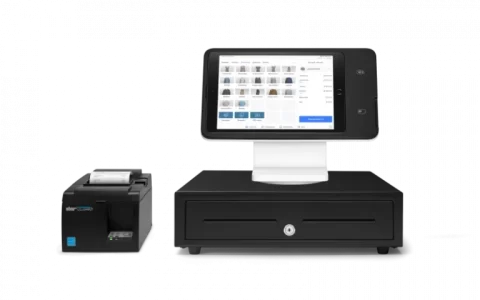
Square is known for its affordable, user-friendly system, especially suitable for quick-service restaurants, clothing stores, and small retailers looking for a scalable solution. Whether you’re opening your first store or expanding your operations, Square offers an easy POS that integrates seamlessly with its own payment system. The key features include:
Pros:
Cons:
Next Step: Request a Free Demo
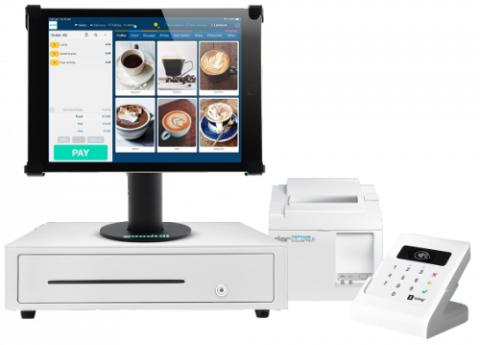
SumUp, after acquiring Goodtill, now offers a robust POS solution for small businesses, including cafés, food trucks, and small retailers. Its user-friendly system is perfect for companies looking to get started quickly and affordably. The key features include:
Pros:
Cons:
Next Step: Request a Free Demo
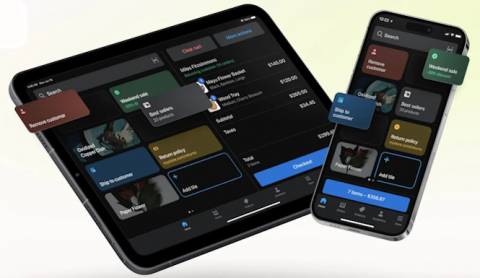
Shopify POS is the perfect solution for businesses with both physical and online stores. If you need seamless integration between your brick-and-mortar store and e-commerce platform, Shopify’s POS will synchronize inventory, orders, and customer data effortlessly.The key features include:
Pros:
Cons:
Next Step: Get a Demo
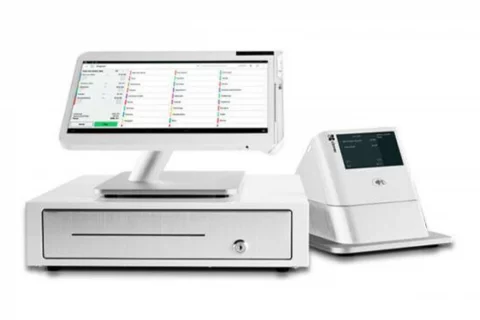
Clover POS is a feature-rich system perfect for multi-store and franchise retailers. With its iPad-based interface, Clover makes it easy to manage your business across multiple locations and track your sales in real time. The key features include:
Pros:
Cons:
Next Step: Compare Providers
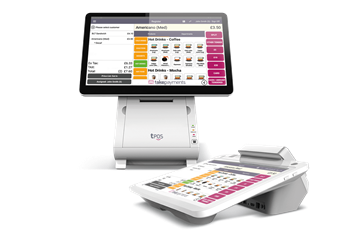
Take Payments POS is an all-in-one solution for retailers seeking flexible options for sales, payments, and customer insights. It’s ideal for independent businesses that want a simple POS system without unnecessary complexity. The key features include:
Pros:
Cons:
Next Step: Find Out More
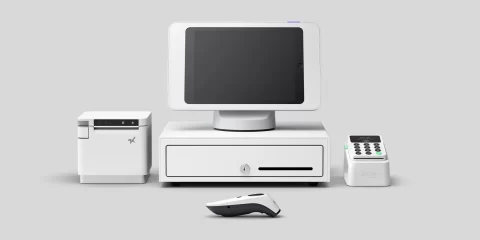
Zettle by PayPal is one of the simplest POS systems, offering an all-in-one solution for small retailers, cafes, and food trucks. It is excellent for those needing quick setup and flexibility without sacrificing key features. The key features include:
Pros:
Cons:
Next Step: Request a Free Demo
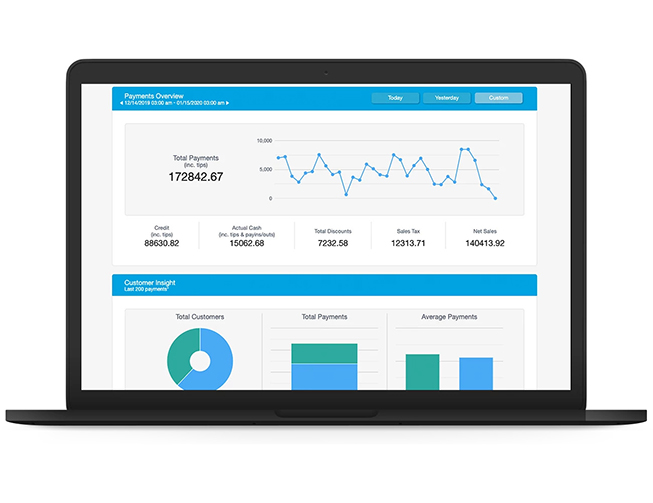
Revel Systems offers a cloud-based POS solution tailored to retailers seeking a highly customizable system. It integrates seamlessly with third-party apps for inventory, loyalty programs, and delivery management. The key features include:
Pros:
Cons:
Next Step: Find Out More
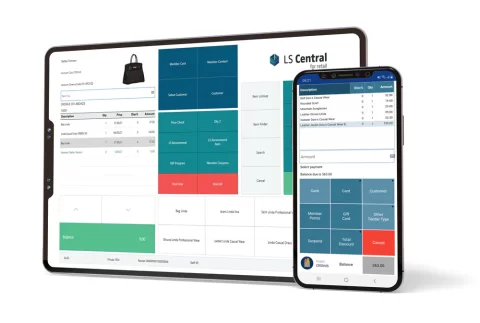
LS Retail brings together all the essential retail features you need in one unified platform. From financials to Point of Sale (POS), store operations, supply chain management, inventory, eCommerce, and customer loyalty, LS Retail provides a holistic solution to streamline your retail operations. Say goodbye to integration struggles and unaligned data. It has offices in London.
Price: LS Retail POS pricing starts from £99/mo
Next Step: Get Matched Now
The following table compares the best retail ePOS systems in the UK:
| ePOS System | Key Features | Pricing | Best For |
| Lightspeed Retail | Multi-location, Inventory, Payment Processing | From £69/month | Multi-location, Omnichannel retailers |
| EPOS Now | Barcode management, eCommerce integration | From £25/month | Small businesses, Boutiques |
| Square Retail | User-friendly, Inventory tracking | Free plan; Paid from £49/month | Small retailers, Startups |
| SumUp Retail | Inventory, E-commerce integrations | From £49/month | Small businesses, Cafes |
| Shopify POS | Omnichannel, Inventory syncing | From £69/month | Small businesses, Cafes |
| Clover POS | Global payment support, Real-time sales | From £100/month | Multi-store, Large retailers |
| Take Payments | Sales trends, Stock & employee tracking | From £45/month | Independent businesses |
| Zettle POS | Simple setup, PayPal integration | From £189 (no monthly fees) | Small businesses, Food trucks |
| Revel Systems | Offline mode, Customizable ecosystem | From £99/month | Large retailers, Multi-location stores |
| LS Retail | Unified platform, Self-checkout | From £99/month | Large retailers, Fashion & Footwear |
Selecting the right retail ePOS system is an essential investment in your business’s future growth. A reliable POS system can help you increase operational efficiency, enhance customer experiences, and optimize inventory management, which are all key drivers of business success in 2025.
When choosing your POS, it’s important to align your system’s features with your business type, growth plans, and budget. For instance:
A future-proof POS system doesn’t just keep sales flowing; it enhances operational workflows, provides valuable data insights, and supports scalability as your business grows.
Make the right choice!
Choosing the best POS system is all about choosing the right partner to help you streamline operations, improve sales performance, and deliver exceptional customer service.